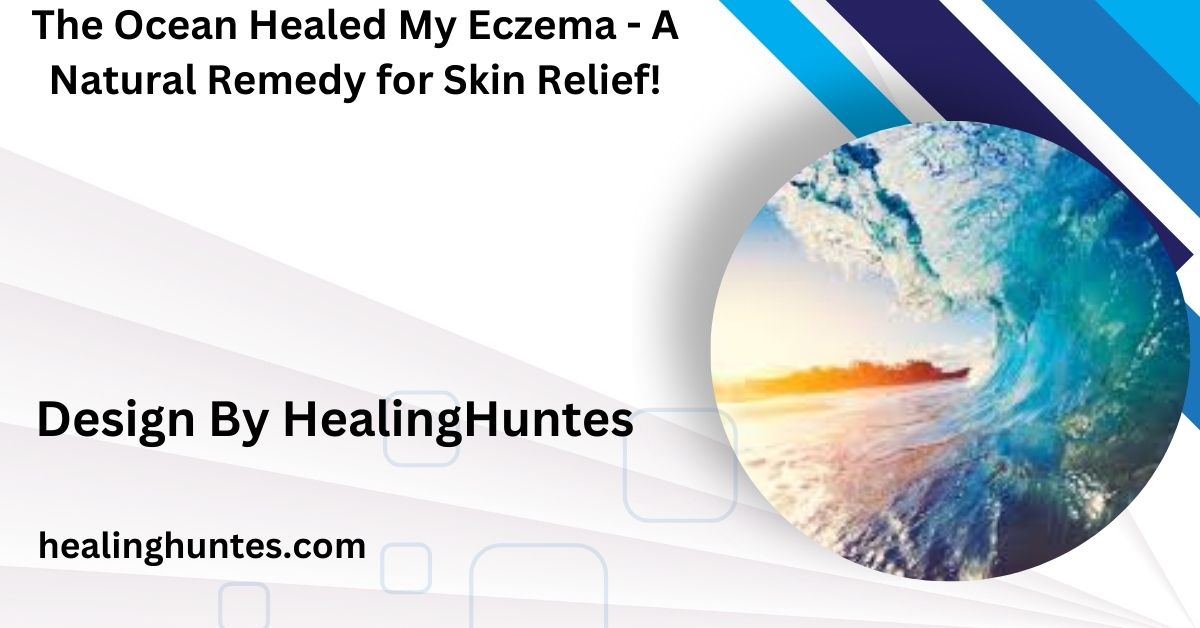The Ocean Healed My Eczema – A Natural Remedy for Skin Relief!
The ocean’s saltwater and environment can naturally relieve eczema symptoms by soothing inflammation and promoting skin health.
In this article, I will share my personal experience of how the ocean healed my eczema, dive into the science behind its healing properties, and explain how you can potentially benefit from this natural remedy.
Understanding Eczema: A Struggle With Skin Health:

Eczema, or atopic dermatitis, is a skin condition marked by dryness, redness, itching, and inflammation. It is often triggered by allergens, environmental factors, or stress, leaving the skin vulnerable to infections and flare-ups. Traditional treatments include steroid creams, antihistamines, and moisturizers, which help manage symptoms but don’t always provide lasting relief.
My Journey: How the Ocean Healed My Eczema:
For years, I battled eczema, trying different medications and skincare routines, but nothing seemed to provide long-term relief. One summer, after a vacation by the sea, I noticed that my eczema had significantly improved. My skin felt smoother, the itching had subsided, and the redness was reduced. It seemed almost miraculous—my skin had healed during my time spent in the ocean.
Initially, I thought it was a coincidence, but after more time spent near the sea, it became clear that the ocean was doing something that no cream or medication had been able to achieve. The more I swam in the ocean, the better my skin became. I decided to research why this was happening and what made the ocean so healing for my eczema.
Also Read: Where Are Self-Healing Materials Used Today – Where Self-Healing Materials Thrive!
The Healing Properties of Saltwater:
The ocean’s saltwater contains numerous minerals, including magnesium, calcium, potassium, and chloride, all of which are essential for healthy skin. These minerals have natural antiseptic and anti-inflammatory properties that can soothe the skin and reduce the intensity of eczema flare-ups. Here’s why saltwater can be so beneficial:
- Magnesium: Known for its calming effect on the skin, magnesium can reduce inflammation and irritation, making it ideal for people suffering from eczema. It also helps maintain moisture levels in the skin, which is crucial for preventing dry patches.
- Calcium: Calcium plays a key role in the renewal of skin cells. It helps heal damaged skin more quickly, reducing the appearance of scaly, rough patches associated with eczema.
- Potassium: Potassium promotes skin hydration and balances fluid levels in the body, helping to reduce the dryness that exacerbates eczema symptoms.
- Chloride: Chloride acts as a natural disinfectant, cleansing the skin of harmful bacteria and impurities that may contribute to eczema.
The high salt content of ocean water acts as a gentle exfoliant, removing dead skin cells and promoting the regeneration of healthy skin. This natural exfoliation process can help reduce the thickened, dry areas that often accompany eczema.
The Ocean’s Role in Stress Reduction:

Stress is a known trigger for eczema flare-ups, and spending time by the ocean is one of the best natural ways to reduce stress. The calming sound of the waves, the gentle breeze, and the soothing environment of the sea promote relaxation and mental well-being. Regular exposure to the ocean not only improved the condition of my skin but also significantly reduced my stress levels, leading to fewer flare-ups over time.
Sunlight:
Moderate exposure to sunlight can benefit people with eczema by increasing Vitamin D production, which is crucial for skin health. Vitamin D helps the body regulate the immune system and reduce inflammation, both of which play a role in eczema management.
Ocean Air: An Added Bonus for Healing:
Beyond saltwater, ocean air itself can have beneficial effects for eczema sufferers. The air near the ocean is rich in negative ions, which help improve mood and reduce stress. The humid, clean air by the sea also keeps the skin hydrated, which is critical for those dealing with eczema. Dry environments often exacerbate the condition, leading to more intense flare-ups. Ocean air offers a naturally humid atmosphere that supports skin hydration and healing.
Also Read: Reiki Healing Near Me – Unlocking the Benefits of Energy Therapy!
How to Safely Use Ocean Water for Eczema Relief:
While the ocean can work wonders for some, it’s important to approach this natural remedy carefully to avoid irritation or infection. Here are a few tips for safely using the ocean to help treat eczema:
- Start Slow: If your skin is very sensitive or if you have open sores, start by spending short periods in the water. This will allow your skin to adjust without overwhelming it.
- Moisturize Afterward: Although the saltwater can provide relief, it may also dry out the skin if you stay in too long. After swimming, rinse off with fresh water and apply a gentle, eczema-friendly moisturizer to lock in hydration.
- Choose the Right Location: Try to find a clean, unpolluted beach to swim in. Pollutants in the water can aggravate eczema instead of helping it.
- Consistency is Key: Like with any treatment, consistency is important. Regular exposure to ocean water, whether through swimming or even just soaking, can yield the best results.
Alternatives to Ocean Water: Bringing the Healing Home:

For those who don’t live near the ocean, there are alternatives to accessing its healing properties. One of the most common options is to create a saltwater bath at home. You can purchase sea salt from health stores and add it to your bath, allowing your skin to benefit from its minerals. Additionally, products such as magnesium-rich lotions and sea salt sprays can mimic the effects of ocean water.
How to Make a Saltwater Bath:
- Add 1-2 cups of natural sea salt to a warm bath.
- Soak for 15-20 minutes, allowing the minerals to absorb into your skin.
- Rinse with fresh water and apply a moisturizer afterward.
While these home remedies may not be as effective as the ocean itself, they can still offer relief for people dealing with eczema.
FAQ’s
1. Can ocean water cure eczema completely?
While it may reduce symptoms, ocean water doesn’t permanently cure eczema but can help manage flare-ups.
2. Why is saltwater good for eczema?
Saltwater contains minerals like magnesium and calcium that soothe inflammation and promote skin health.
3. How often should I use ocean water for eczema relief?
Regular, consistent exposure, around 2-3 times per week, may help improve symptoms.
4. What should I do after swimming in the ocean?
Rinse with fresh water and apply a gentle moisturizer to prevent drying.
5. Are there home alternatives to ocean water for eczema relief?
Yes, saltwater baths or magnesium-based lotions can mimic some ocean benefits for eczema relief.
Conclusion
The ocean has provided me with a natural, effective remedy for my eczema, improving both my skin and my overall well-being. With its salt-rich waters, calming atmosphere, and health-promoting environment, the ocean offers a holistic approach to managing eczema symptoms. While it’s not a miracle cure, the ocean has proven to be a powerful ally in my journey toward healthier skin.






